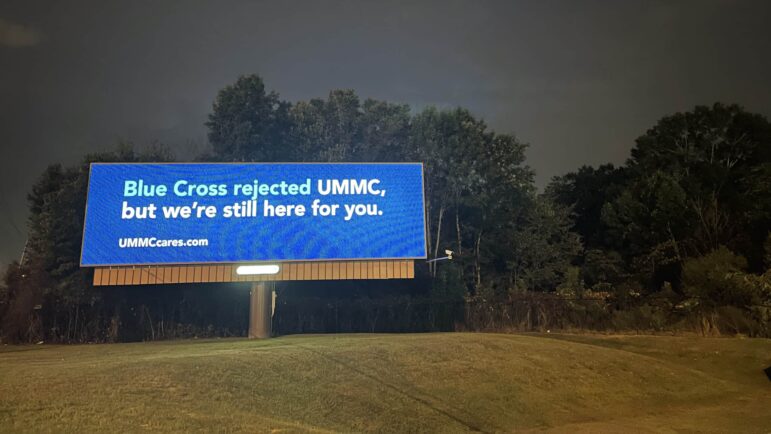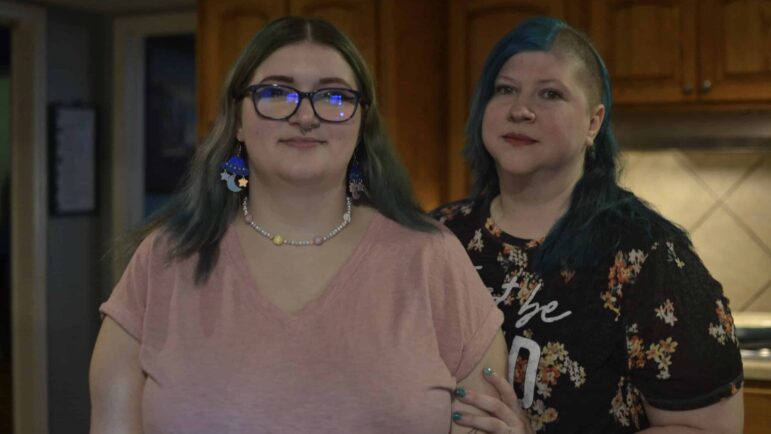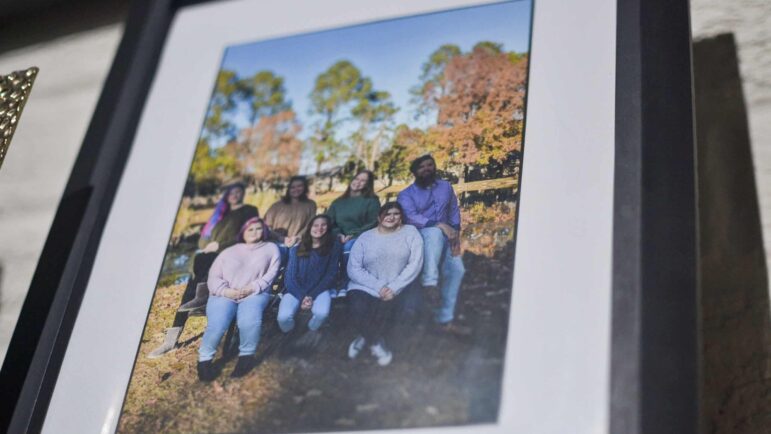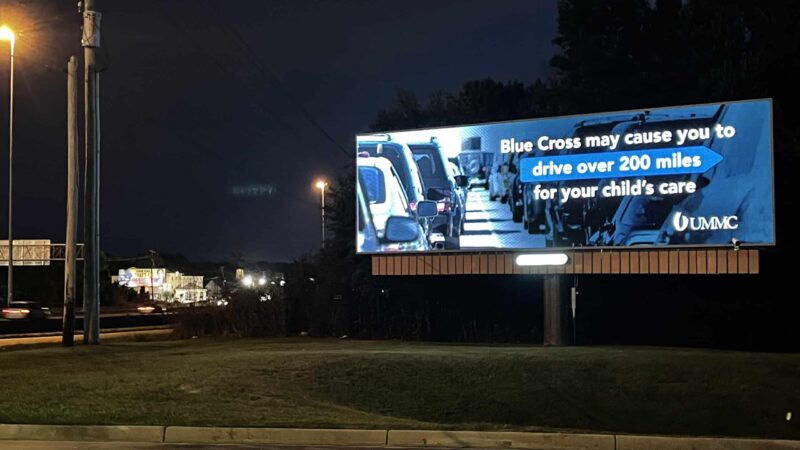Conflict between Mississippi’s largest hospital, insurer a breaking point for some residents
Billboards in several cities across Mississippi, like this one from Aug. 16, 2022, highlighted a dispute between Blue Cross Blue Shield of Mississippi and the state’s largest hospital, the University of Mississippi Medical Center, in Jackson, Mississippi.
Natasha Zinda had spent the last 12 years of her life in Mississippi. But in September, she packed up her car with her personal belongings, her kids, and one of her best friends, and drove up the state’s main interstate to a town just outside of Chicago.
Zinda was not in danger, nor was her family seeking asylum in Illinois. But as Zinda and her friend, Jessica Slade, laughed and shared stories over a phone call on her road trip, she sighed and said, “I’m free.”
Zinda considers herself to be a “medical refugee.” Over the past year, Mississippi has been reeling from one issue after the other; redistricting policies, a water crisis in Jackson, failure to expand Medicaid, passing anti-trans legislation, and a decision to implement a 15-week abortion ban that became the basis for the Supreme Court’s overturning of Roe v. Wade.
Those issues have been on her mind for a while, but one specific medical concern became the catalyst for her decision to leave Mississippi. In April, the University of Mississippi Medical Center allowed its contract with her insurance company, Blue Cross Blue Shield of Mississippi, to expire.
While the contract technically expired that month, many people insured by BCBS had continuity of care — which meant they could continue seeing their doctors at UMMC and pay insurance-based prices for services. That period expired on June 30, forcing those customers to pay out of pocket for follow-up care and non-emergency services at any of UMMC’s 6 hospitals and more than 30 clinics statewide. This left patients like Zinda, who is covered by BCBS, no longer covered for care at the state’s largest hospital.
Zinda and her children are Black, and her son identifies as transgender. The change in policy left her unable to afford to keep sending her son — who already struggled to find doctors in the state willing to offer gender-affirming care — to the doctors he knew at UMMC. She said she and her family did not feel safe enough to be healthy staying in Mississippi, necessitating the move.
“I don’t want to raise my kids in places where their gender or the body parts that they have are what holds them back to access or lifesaving care, ” she said.
Conflict ‘all boils down to money’

For the past several months, UMMC and BCBS have been fighting over who is to blame for the lack of covered care. Local media sources found UMMC had spent nearly $279,000 on digital ads, commercials and billboards attacking BCBS. Recently, the insurer sued the hospital for defamation.
This conflict essentially boils down to money. UMMC is, among other things, Mississippi’s only level 1 trauma center, level 4 neonatal intensive care unit and children’s hospital. BCBS is the largest commercial insurer in the state. And while UMMC wants more money from BCBS for its services, the insurer is pushing back against the idea of UMMC getting that raise.
While the ongoing saga has been well documented by news outlets across the region, there still seems to be no end in sight. In mid-October, the mediation process between the two groups was officially terminated. While BCBS says that isn’t true, the Mississippi Insurance Department says any ongoing mediation between both groups is informal.
The state hospital says BCBS has only given them a 1% increase in their reimbursement rates over the last five years and isn’t paid as much as other regional research hospitals. UMMC argues that its specialty services are unique in the state and that they deserve to be reimbursed more from the insurer, which they argue is economically very secure in Mississippi.
BCBS argues that in order to justify that raise, they’d need to see a higher quality of care from the hospital and that they’d lose out on the chance to monitor UMMC’s services. That would mean their customers might end up paying higher premiums for their insurance coverage.
But, the real impact here isn’t on the hospital or the insurance company; it’s the thousands of patients, like Zinda and her family, who are caught in the middle waiting for a solution.
Patients used as bargaining chips
Both companies are fighting over profits from patients who may just leave the state instead.
“Blue Cross Blue Shield is great insurance for us and for our family,” Zinda said. “It really was meeting our needs, then throwing a wrench in UMMC care is a giant pressure on us to say, OK, we can’t do this anymore’ … we are now seeing a total lack of healthcare in Mississippi on multiple levels.”
Zinda says her friend group is relatively young — 30- and 40-somethings with new families that want to see a future in Mississippi, but feel like it’s no longer possible for them. In fact, soon after Zinda packed her bags and moved, her father decided to leave Mississippi as well.
Slade, who helped move Zinda to Chicago, is a mother and stepmother to 10 children, all of whom deal with a lot of medical issues. During the car ride, she said her husband had started looking for jobs elsewhere too.
“I know that we’re not probably the first people that are leaving because of this, and we won’t be the last,” Zinda said. “I see a lot of people in my age group talking about leaving.”
The ordeal isn’t just upending patients’ lives. There’s some evidence that patients are being used as bargaining chips.
For example, UMMC dropped BCBS months before open enrollment — when patients can shop for new insurance plans — leaving those insured by BCBS essentially stuck in limbo with insurance they can’t use at the hospital for months.
Amanda Starc, a health economist at the Kellogg School of Management at Northwestern University, says that timing was no accident.
“The hospital’s negotiating leverage comes from the fact that they’re essentially a monopoly,” Starc said. “What might [Blue Cross] enrollees do if they don’t have access to that monopoly hospital in their network? They’re going to switch insurance plans, and that puts pressure on Blue Cross Blue Shield.”
BCBS has quite a bit of leverage here, too. They’re the state’s largest insurer, holding 56% of the commercial health insurance market, according to 2021 estimates. Because so many Mississippians are in their plans, UMMC could lose a big patient base if a deal isn’t made.
Starc says these disputes and contractual issues are very common. BCBS of Illinois had a similar contract issue with a major health care system in 2021, with upwards of 50,000 patients impacted by a temporary loss of coverage, according to local reports. Earlier this year, a contract dispute between BCBS of Texas and the Memorial Hermann Health System — the largest for-profit health system in Southeast Texas forced nearly 200,000 people out of the network.
What’s rare about the dispute in Mississippi, Starc says, is that there is still no agreement — more than seven months later.
“Patients are actually being harmed,” Starc said. “Normally, we don’t let it get to the point where any patients are being harmed.”
Both UMMC and BSBS disagreed with how they were characterized in the story but refused to give details on why.
“We continue to be disappointed that our commercial Blue Cross-member patients do not have in-network access to UMMC hospitals, clinics, physicians and other providers,” a spokeswoman for UMMC said.
Similarly, Blue Cross declined to explain much about its position.
“Blue Cross & Blue Shield of Mississippi has been, and continues, in mediation with UMMC to reach a long-term solution which is in the best interest of Blue Cross Blue Shield Members and UMMC patients. We can make no further comment,” the insurer said in an email.
Emails shed light on patients’ burdens

Three years ago, Layla Hill broke her leg during dance class. She should have healed normally but was diagnosed with congenital pseudarthrosis, which is a break in the bone that fails to heal on its own. As an 8-year-old Hill has spent much of her childhood in a cast or in a wheelchair and has already gone through three surgeries at UMMC to try to fix her leg. Now, a plate that was put on her tibia bone is slipping off.
She needed surgery in June, but UMMC told her that her insurance policy through BCBS was now out of network. Kaila Hill, Layla’s mom, said UMMC estimated the surgery would cost upwards of $30,000 after the hospital refused to allow an exception where a patient can use out-of-network insurance to cover a bill.
“She still hasn’t had surgery, and she literally has a plate coming off of her leg,” Hill said. “It makes me feel like they’re selfish. I don’t want to be ugly, but that’s how I feel.”
At the Mississippi Insurance Department, Commissioner Mike Chaney appears visibly concerned and disappointed over cases like this. He’s in charge of handling consumer concerns for all types of insurance problems. But for the last several months, he says, health care seems like it’s been over half of his job, demanding more time than issues with other types of policies — like life insurance, homeowners insurance and renters insurance — he handles.
“They knew what they were doing. I’m mad at both of them. Let me make that clear. I’m not happy with either one of them,” Chaney said. “This should have never happened. [They] put the lives of thousands of Mississippians on the line simply because of money.”
The Gulf States Newsroom acquired hundreds of pages of emails and consumer complaints from the Mississippi Insurance Department. These emails, including those of parents like Kaila Hill, highlight the tense relationship between the feuding parties but also shed light on how patients are being handled.
Patients describe scenarios in which they feel like their lives are being upended and financial burdens they were not prepared to handle.
UMMC has claimed that it’s not turning patients away based on insurance status, but Hill says she feels like she was essentially denied. She says a nurse told her UMMC would not be doing a single case agreement for her. Her family is taking Layla to a hospital in Alabama for urgent care. It’s in-network with BCBS.
“We had enough. We couldn’t afford it,” she said. “We have spent so much time at UMMC and with our doctor, and I have grown to trust her a lot. So it’s just really depressing and upsetting.”
Another email chain points to more evidence of potential denials.
UMMC’s children’s hospital is also the only place to send children suffering from rare illnesses and cancer. In another email chain, a parent writes that they’re confused and overwhelmed that their child may not be able to receive continuous care at Blair E. Batson Children’s Cancer Clinic.
Although they were initially assured that their child would receive continuous treatments, they write that they were later informed that they “may have to go somewhere else.”
“I understand that what it basically boils down to is money…. I feel like this is so unfair,” they wrote.

Other emails showcase the fear and anxiety some patients are grappling with. One consumer talks about having to travel hours outside of the state to cities without the support of friends or family in order to receive vital care.
“We need to make some hard decisions,” another wrote about their loved one, who needed immediate care. “They are telling us we might need to go to New Orleans. We do not have time to wait. We have been with our doctors for over 15 years.”
Even doctors are emailing the insurance department on behalf of their patients. On April 20, Melissa Smith, a doctor at Mississippi Ear, Nose & Throat Surgical Associates, wrote, “our patients are being told… they have to pay out of pocket.”
She explained that a neck surgery estimate equaling $27,000 would require a $10,000 upfront payment without insurance.
“Most of the Mississippi population cannot afford this,” she said.
Chaney doesn’t have the authority as insurance commissioner to directly step in and referee the conflict between UMMC and BCBS. But in April, he sent them both a letter urging them to enter into a mediation process with an outside arbiter.
Chaney says both sides could be hurting themselves. Insurance companies have to prove they are “network adequate” in Mississippi, meaning they can still provide the services their policyholders have paid for. Without UMMC, there’s a question of whether BCBS is still network-adequate, and Chaney’s department is conducting a review.
Chaney says if they are found to be inadequate, BCBS has to come up with a remediation plan. He says the department could elevate the issue to the state attorney general’s office and fine the insurer, but the review isn’t complete, so that’s not an option he is considering right now.
On the other side, Chaney says the medical center — by some interpretations — could be breaking the law. UMMC is a state-funded hospital, and state law requires that it “shall be utilized to serve the people of Mississippi generally.”
“That law specifically says that the University of Mississippi will serve all Mississippians. Not just those who choose to serve. If they’re not doing that, they’re breaking the law, in my opinion,” Chaney said. “It should be a moral and ethical obligation of the University Medical Center not to tell people, ‘We’re not going to treat you. We don’t care if you die.’”
The burden of healthcare in one of the poorest states

As Zinda drove out of Mississippi, she said her experience there felt like a contradiction.
“I felt like I had to have cognitive dissonance to exist in Mississippi and be the person that I am, to be a person that believes in equal opportunities,” she said.
That frustration quickly consumed Slade’s life when she returned home from helping Zinda move. Many Mississippians can’t afford egregiously high bills, and neither can Slade’s family.
Last year, the family spent upwards of $10,000 on medical bills even with insurance. For the last several months, she’s felt the burden of finding affordable doctors in a state that lacks specialists due to the UMMC-BCBS conflict.
Slade’s daughter, Kylie Silverman, is 17 and fully deaf in her left ear and mostly deaf in her right ear. Her cochlear implant hearing aid is broken, and she can’t see her audiologist at UMMC to get it fixed. Silverman says she’s frustrated because she can’t communicate properly at home with her family that doesn’t know sign language.
Slade’s other daughter, Sadie Silverman, struggles with polycystic ovary syndrome and kyphosis scoliosis. Her specialists are at UMMC, and she needs a check-up.
Slade has felt like she’s stuck between a rock and hard place right now. Watching her friend leave only adds to that feeling. She and her husband, as well as six of her children, have relied on half-a-dozen specialists at UMMC to get their care.

“Pretty much [every hospital] is faith-based, and we are not a faith-based family. We are a science-based family. And so it took years [to find doctors],” Slade said. “There are so many unknowns. What if we do move? We have to do it all over again.”
Just two months after she dropped Zinda off in Illinois, Slade and her family decided they’d also had enough. Slade’s husband signed a work contract within his company that would move the family to a town on the Indiana border — just a few hours away from their best friend.
“We need to have a safe space that’s not just within the walls of our home,” Slade said. “Now, I see the light at the end of the tunnel… We’re going to a place where our doctors are going to be easily replaced.”
Slade says she’s excited to open this new chapter of her life, but is sad that she and her children’s health has been put in jeopardy.
“It’s not fair. It’s a common thing in Mississippi health care, that it’s not about us. It’s not about the patients,” Slade said. “This contract issue is just par for the course here in Mississippi.”
This story was produced by the Gulf States Newsroom, a collaboration between Mississippi Public Broadcasting, WBHM in Alabama, WWNO and WRKF in Louisiana and NPR. Support for public health coverage comes from the Commonwealth Fund.
Guantánamo plea deals for accused 9/11 plotters are canceled by federal appeals court
A federal appeals court has canceled plea deals with three men accused of orchestrating the 9/11 attacks, deepening the legal morass surrounding the long-stalled case.
Gen Z is afraid of sex — and for good reason
Gen Z is in a sex recession. Not because they're less horny, but because they're more afraid.
Nigeria says it won’t accept U.S. deportees: “We have enough problems of our own”
Nigeria's government is pushing back against U.S. efforts to send them migrants and foreign prisoners, with Nigerian Foreign Minister Yusuf Tuggar quoting Public Enemy to drive home his point.
Wet Leg are back with a slick new record
The English band's sophomore album, moisturizer, is out today. Co-founder Rhian Teasdale joins World Cafe to talk about it.
Judges to weigh request to put Alabama under preclearance for a future congressional map
Black voters and civil rights organizations, who successfully challenged Alabama’s congressional map, are asking a three-judge panel to require any new congressional maps drawn by state lawmakers to go through federal review before being implemented. The Alabama attorney general and the U.S. Department of Justice oppose the request.
Sumy, a center of Ukrainian culture, lives in the crosshairs of a new Russian offensive
The northern regional capital has become a frequent target of Russian drones, missiles and guided bombs. Now, Ukraine's top general says at least 50,000 Russian troops have massed across the border.






